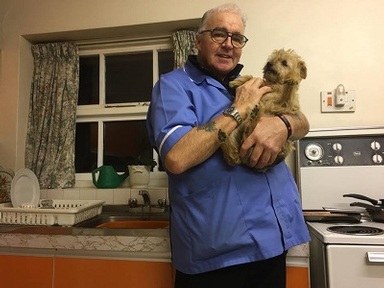Ethical home care firm hailed champion of living wage movement
Home care provider Penrose Care has been hailed as a leader in the care industry for its contribution to the living wage movement and ethical working practices. 
Penrose Care has been awarded the Living Wage Champion Award for Industry Leadership by judges including Observer journalist Yvonne Roberts and Tess Lanning, the director of the Living Wage Foundation.
The UK Living Wage is £8.75 per hour calculated according to what workers need to make ends meet but it is employers who can choose to take a stand by ensuring their staff get it. Penrose Care has offered its staff the living wage for the past six years.
Tess Lanning, director of the Living Wage Foundation, said: “Employers like Penrose Care are leading the way in placing dignity and respect at the heart of their organisation. Over 4,200 employers have now signed up to the movement. Penrose Care’s work in celebrating and championing the Living Wage has been vital to its success.”
Real living wage Vs Government’s
The Government introduced a minimum wage rate in 2016 for staff aged over 25 called the ‘National Living Wage’. But the Living Wage Foundation encourages bosses pay more to ensure their workers earn a wage that meets the real costs of living.
Back in 2012, Penrose Care (based in Hampstead, London) became one of only four real living wage accredited home care providers in the capital (out of 1,000 home care agencies).
Penrose Care has also put in place what the Living Wage Foundation has rated “outstanding labour standards”. These include guaranteed weekly hours (20 hours per week), payment for travel time, private medical insurance and an occupational sick pay scheme.
Not 'like machines in a warehouse'
‘These standards have set Penrose apart from its peers and highlighted the possibility of decent pay and conditions within the care sector’, the Foundation stated.
Robert Stephenson-Padron, Penrose Care's managing director has said in a blog how years of councils tendering out home care services to the lowest bidders without reference to legal labour standards, resulted in a sector of contract winners that pay workers below the minimum wage - with them carrying out 15-minute home visits “like machines in a warehouse”.
He said local councils and providers “turn a blind eye to years of labour exploitation”.
‘Outsourcing criminality’
Mr Stephenson Padron told homecare.co.uk:
“Local authorities have not been funding care in a way that covers the minimum wage at least so they are outsourcing criminality. But it’s everybody’s responsibility. Providers too. It has to be difficult for some providers to stay within the law and to be economical. They must look at their business model and rearrange it. Most providers should look at complying with the law. Accepting a local authority contract that is too low and does not even take into account the minimum wage is very irresponsible. It is not acceptable to say because local authorities don’t pay enough, we can’t pay our staff more. We won’t take dirty contracts.”
The care sector’s sleep-in pay crisis saw Government tell care providers to pay back pay owed to their ‘sleep-in’ care staff.
The Government said minimum wage must be paid throughout a worker’s shift - meaning overnight care workers on ‘sleep-ins’ must earn minimum wage rather than a flat-rate allowance.
He believed it is wrong to say the law is not clear. From the start, he says care providers should follow the law. “It has always been clear. If you are at a place of work and you can’t leave you are working. A sleep-in carer can’t just pop out to the cinema, they are working. They must be paid.
“If you are going to cut corners you shouldn’t be in the business of care. It’s no good to say, I’ll just cut this corner. If everyone cuts a corner, there’s no corners left.”
'Bright spots' in sector
Penrose Care has 20 employees and 16 home care clients including the elderly and disabled. The managing director has not ruled out expansion, provided ethical practices remain central to the business. Penrose Care is one of only seven care providers (out of over 26,000 in England) to back Citizens UK's Social Care Charter at its 2013 launch.
But the managing director remains hopeful for the sector: “There are bright spots in the sector. More and more local authorities are signing up to the social care charter.”
Home care staff in Manchester saw their pay rise last April from £7.50 (NLW) to the ‘Manchester Living Wage’ of £8.75 - a rise of nearly 17 per cent. Manchester City Council gave a £1.5m cash boost to its commissioned organisations which supply care staff - on the condition that employees receive “a proper living wage”.
Olga García Gómez, who has worked at Penrose Care since 2014 as a support worker and is now a deputy manager, said: “The company feels more like a family and whereby you always feel supported due to a variety of ethical working conditions including the London Living Wage, and having available a manager 24/7.
“In addition to all this, you can develop your professional career at Penrose Care as I have. For someone coming from abroad, all these factors are very important in a job.”
Penrose Care’s ethical initiatives also include:
• Taxis home for staff working after 9pm
• Payment for training courses
• Premium pay for working on planned days off
• Wage advances for managing cash flow
• Minimum wage compliance for sleep-ins
• As employees of Penrose Care (Full holiday entitlements and pension)
• 24/7 access to management
Latest Innovative Care News
 13-May-19
'Pink drink' brain cancer treatment rolled out across NHS in memory of Baroness Jowell
13-May-19
'Pink drink' brain cancer treatment rolled out across NHS in memory of Baroness Jowell
 25-Apr-19
Louis Tomlinson helps 83-year-old who lost wife to dementia complete bucket list
25-Apr-19
Louis Tomlinson helps 83-year-old who lost wife to dementia complete bucket list
 05-Mar-19
Care worker of the year inspires nine-year-old son to work in care
05-Mar-19
Care worker of the year inspires nine-year-old son to work in care
 12-Feb-19
Michael McIntyre's jokes tested to see if they stop elderly catching flu
12-Feb-19
Michael McIntyre's jokes tested to see if they stop elderly catching flu
 25-Jan-19
Ninety-year-old and his dog can stay together, thanks to care worker
25-Jan-19
Ninety-year-old and his dog can stay together, thanks to care worker